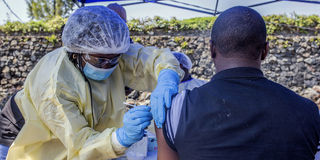In eastern DR Congo, influx of Ebola money is source of friction

Butembo. The UN is about to pound the drum for millions of dollars to stiffen the fight against Ebola in DR Congo, but at the heart of the epidemic, a money influx may worsen grassroots problems.
On Wednesday, the World Health Organization (WHO) declared that the nearly year-old outbreak was a "public health emergency of international concern" -- a rarely-invoked step to beef up global response.
The WHO's head of emergency operations, Mike Ryan, said there would soon be an appeal for additional funds, amounting to around $230 million (205 million euros) at the least.
But in the eastern city of Butembo, the epicentre of an outbreak whose death toll is now nearly 1,700, local people say many lives have already been turned upside down by Ebola money.
In a city where many struggle by on just a few dollars a day, a tsunami of cash has brought with it a tide of gleaming SUVs and other signs of wealth.
Jealousy, frustration and even violence, they say, have sometimes been the result.
- Wealth -
"Beforehand, the people didn't know the NGOs, the humanitarian workers," said Butembo's mayor, Sylvain Kanyamanda."Then all of a sudden they saw lots of these huge 4x4s appearing in town."
Kanyamanda added: "People have reacted strongly.
"They didn't understand how the government and the international community could invest so much money and means in Ebola, when they do nothing to fight massacres by the ADF," a notorious militia that has slain hundreds of people.
The deputy head of civil society in Butembo, Edgar Mateso, said a common complaint was that little of the money was trickling down to Congolese.
"From the start of the epidemic, the demands have always been the same, to replace expatriates by nationals.
"Some are saying, 'You've come from your countries to make money out of our dead'."
A locally-born doctor said before Ebola broke out, he earned $100 a month, but was now earing $600 after being hired in the fight against the disease.
"But doctors who have been brought in from Kinshasa earn $4,500 a month, as well as a daily allowance of $150 a day," he said. "It's a cause of frustration, that's for sure."
Tens of millions of dollars have been spent on combatting Ebola in eastern DR Congo since August last year.
Some of the money has been used to buy vaccines and other drugs, but much of it is spent on time-honoured, labour-intensive work -- isolating patients, tracing people who have been in contact with them or teaching local people about risks.
A Congolese worker hired by an international organisation to help on the prevention side said there were "major differences" in conditions among members of his team.
Those who had been hired by international partners such as the WHO and Unicef were always paid on time, but those who were hired under a Congolese health ministry programme invariably received their pay late, he said.
- Attacks -
Jealousy and resentments have led to violence -- much of it fomented or executed by militia groups who benefit from turmoil.
Seven health workers have been murdered and more than 50 have been seriously hurt, according to an unofficial tally.
Two of the deaths occurred this week. A health ministry official told AFP that several sources had said the assailants were people who lived in the victims' neighbourhood "and were jealous because they had found a job in the Ebola campaign."
One of the fatalities, a woman, "had already been attacked a few weeks earlier but had been able to save her life by paying off her assailants", the source said.
The Congolese prevention worker confirmed that in this region of deep poverty, plentiful guns and widespread lawlessness, Ebola workers faced a high risk of extortion.
"Many of my colleagues have fled Butembo because they feared for their lives," he said.
"In their communities, people know that they have been working for international NGOs, and because of that they can be followed all the way home.
"They get threatened, including death threats. People say, 'You are pocketing money from the fight against Ebola. Give me $2,000 -- if you don't have $2,000, we'll shoot you'."




